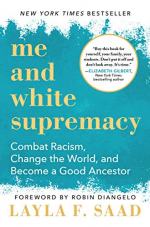
|
| Name: _________________________ | Period: ___________________ |
This test consists of 5 short answer questions, 10 short essay questions, and 1 (of 3) essay topics.
Short Answer Questions
1. The term “white silence” carries what meaning in the book?
2. Saad quotes Claudia Rankine as writing “For Serena, the daily diminishment is a low flame, a constant drip" (71). The sentence offers examples of which of the following?
3. The phrase “real, raw, ugly truths” (36) offers an example of which of the following?
4. Saad writes about “the sticky web of white supremacy” (105). The phrase offers an example of which of the following?
5. How many examples of white privilege does McIntosh articulate?
Short Essay Questions
1. Why does Saad note that some persons of color will benefit from doing the work outlined in the book?
2. Why does DiAngelo view the question of “Now what do I do?” (11) as problematic?
3. Why does Saad refer to her work as shared with a global audience?
4. Why would a person work through the book non-sequentially?
5. For whom does Saad write the book? That is, who is her expected primary audience for it?
6. Which rhetorical appeal/s is / are made when Saad cites Ellen Pence in discussing white exceptionalism (101-02)?
7. Saad notes that “On Day 7, we do not take a day off" (105). What is she likely referencing? Why would she reference it?
8. To what does “intersectionality” refer in the book?
9. How does the desire to seem good hamper being good?
10. What does Saad note is the purpose of the work outlined in the book?
Essay Topics
Write an essay for ONE of the following topics:
Essay Topic 1
Saad comments on the normalization of white-privileged perspectives working to marginalize the perspectives and understandings of BIPOC. What other perspectives are normalized? What perspectives do they necessarily marginalize? What is elided or hidden by such marginalization? What harm accrues to that marginalization? How does it do so?
Essay Topic 2
In “A Little about Me,” Saad rehearses her family background, noting her parents’ immigration history, their movements among countries, and their career paths. She uses her family’s experience and her own to situate herself as having authority to discuss the matters in the book. Wherein does she have authority? Wherein does she lack it? How does the text show it?
Essay Topic 3
Saad notes confusion over the assertion that identifying her as Black is rude, remarking that it is an accurate descriptor of her. For one such descriptor, why might it be offensive? Wherein lies the difference between an offensive epithet and an accurate description? Why is it at that point?
|
This section contains 778 words (approx. 3 pages at 300 words per page) |

|




